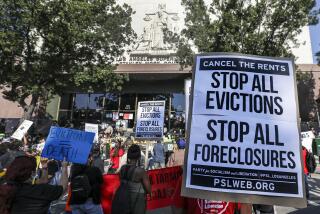Q&A: Strict rules govern evictions by landlords, including homeowner associations renting units
Question: I’ve been renting a house for more than 20 years, and my landlord is a homeowners association. Recently, the landlord put a “3-Day Notice to Pay Rent or Quit” on my door stating I was behind in rent and detailing what months I owed. I wrote the landlord stating the information in the notice was inaccurate.
A few days later another 3-Day Notice was placed on my door claiming that I had not fully paid for other months. The landlord wrote that I owed rent for 2014 and had not paid my rent for October and November of last year. The notice also stated that even though I later wrote checks specifying they were to cover my 2015 missed payments, the funds were applied to what was owed in 2014. As a result, the landlord said I still owed two months’ rent for last year.
It’s all very confusing. More than five years ago, one month’s rental payment was never cashed. I was not notified of this. And sometimes the landlord holds onto my timely paid checks and then cashes them two, three, four months later. Is that legal? How far back can the landlord claim rent was unpaid? Can the landlord disregard my check notation for which month’s rent the check is to be applied? Is the “3-Day Notice” valid if it contained inaccurate information? I cannot afford to move, what should I do?
Answer: A homeowners association must follow the law just like any other landlord.
In California, under Code of Civil Procedure 1161(2), landlords can only seek unpaid rent for the last 12 months, through an unlawful detainer action.
A three-day notice to pay containing major inaccuracies is probably invalid. A proper three-day notice to pay or quit must be in writing and include the tenant’s name, address of the property in question, how much rent is owed, dates of overdue rent, the specific date the rent must be paid and instructions on how to pay the overdue sum. It also must not include any other fees owed to the landlord other than rent.
There is no requirement for the landlord to cash your rent check by a certain date, but it is a good idea to demand your checks be cashed when received to avoid confusion. It is also wise to make a notation on the check as to which month’s rent the check is to be applied. As a precaution, tenants should insist on some proof of payment, such as a written receipt, which the law requires landlords to provide on demand. Do not merely rely on the back of a cashed check as a substitute for a receipt.
Try to resolve the situation by talking to your landlord. If that is difficult because it is a corporation or homeowner association, write to the board asking to meet with an association representative or manager. Send that communication by registered or certified mail. You can also try talking directly to the board to reach a middle ground. Ask for a payment plan or some other remedy that will help keep you in your home.
If that does not work and the association continues with the eviction process, try mediating the controversy at no charge through the Los Angeles city attorney’s Dispute Resolution Program, (213) 978-1880. Or you can seek legal representation of your own. The resolution method you choose should be executed with a sense of urgency. If your landlord violated the law and you prevail in court, you may be entitled to recover attorney fees, depending on your lease agreement.
Avi Sinai is a Santa Monica attorney specializing in landlord-tenant law and host of the Sinai Legal Blog at www.losangeleslandlordlawyer.com where landlords and tenants can ask questions and find answers at no cost. Vanitzian is an arbitrator and mediator. Send questions to Donie Vanitzian, JD, P.O. Box 10490, Marina del Rey, CA 90295 ornoexit@mindspring.com






